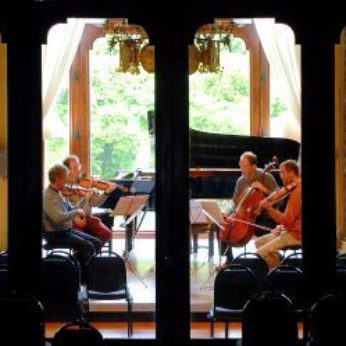Anna Akhmatova, author of Requiem and Poem without a Hero and greatest Russian poet of that doomed generation, dedicated these lines to Shostakovich. She used to attend his Leningrad premieres; they were both beacons of light in a terrible time. They both suffered in Stalin’s purges and for a long time feared for their lives, though Shostakovich was never made homeless nor put in danger of starvation.
The composer and pianist Moishei Vainberg was a close friend and colleague of Shostakovich. His family were Polish Jews, slaughtered by the Nazis in 1939. In February 1953 Vainberg was arrested and Shostakovich took the lunatic step of intervening with Beria on his behalf. Luckily Stalin’s death came in time and Vainberg was released. The two had an ongoing string quartet competition, and in July 1964 Shostakovich wrote to a friend; Yesterday I completed another quartet. It is dedicated to M.S.Vainberg. He had written ten quartets and thus overtaken me. I therefore set myself the task of catching up with him, which I have now achieved. However Vainberg won the competition in the end as he wrote seventeen quartets, though we get to hear very few of them.
The Andante that opens this quartet is serene and untroubled and it acts as a calm prelude to the storms of the Allegretto furioso. The question posed in the first bars is answered peacefully and out of this exchange emerges a consolatory theme of great beauty. The subsequent dialogue flows gently before quietly fading away. This makes the brutality of the Scherzo all the more horrific – the power and savagery of this movement sweeps all more civilised emotions away.
The Adagio in A minor that follows takes the form of his favourite passacaglia, a theme of transcendent beauty followed by eight variations. Shostakovich wrote this quartet at a composer’s retreat in Armenia, near where his first wife, Nina, had worked. She had died from cancer in 1954, but there is much in this quartet that speaks of her. The finale follows without a break. This is the longest movement and it carries the weight of the work’s resolution. It opens with a bouncy little theme on the viola that leads to an idea akin to an Armenian hurdy-gurdy folk dance. This is then married with the energy of the opening theme, building gradually to a powerful climax, when the passacaglia theme is dramatically recalled. The coda reintroduces the first movement theme closing the circle and the morendo ending is witty and almost cheerful, dispelling the darkness of the second movement.
